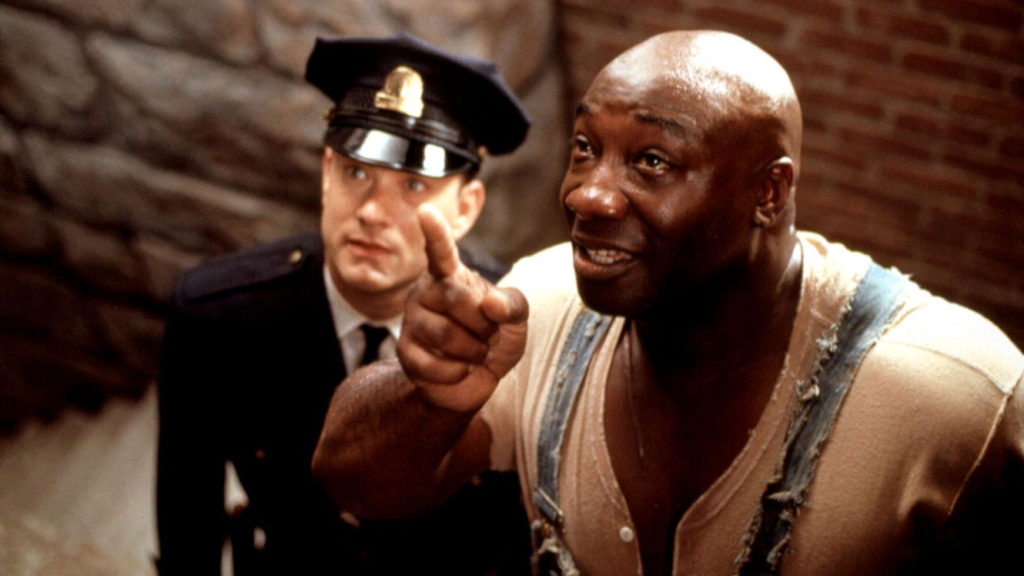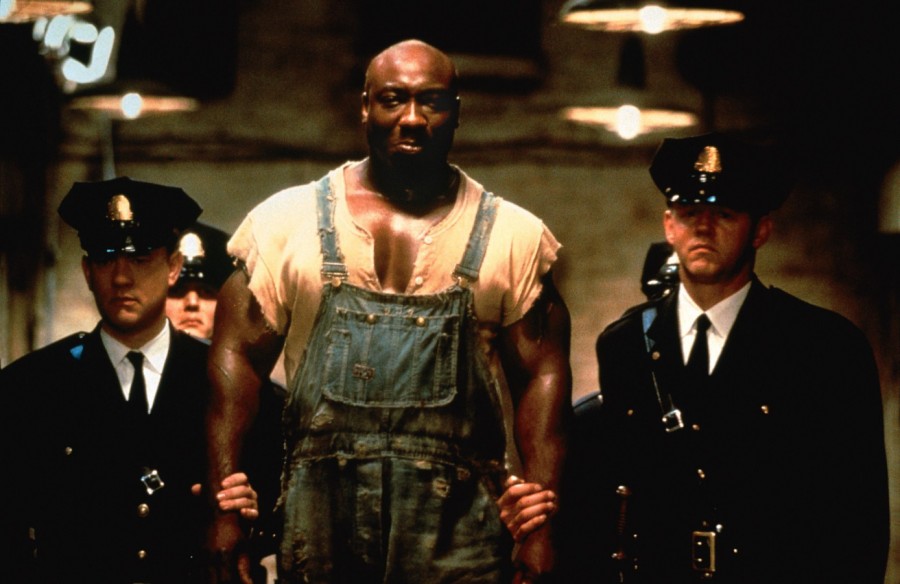The Green Mile (1999)

DIRECTOR: Frank Darabont
CAST: Tom Hanks, Michael Clarke Duncan, David Morse, Bonnie Hunt, Doug Hutchison, Sam Rockwell, James Cromwell, Patricia Clarkson, Barry Pepper, Jeffrey DeMunn, Michael Jeter, Graham Greene, Gary Sinise, Dabbs Greer, Harry Dean Stanton, William Sadler
REVIEW:
For the second convergence of Stephen King and Frank Darabont, following 1994’s The Shawshank Redemption, lightning has struck twice. The two films stand tall together as not only the best book-to-film adaptations of King’s prolific works, but also as great motion pictures period. It’s only Darabont’s second film since his impressive debut with Shawshank, but it demonstrates that the previous movie was not a one-hit wonder. Like Shawshank, The Green Mile is a well-crafted, emotionally powerful drama that requires a sizable commitment of time and attention, but the rewards are worth the effort.
The vast majority of The Green Mile, apart from prologue and epilogue bookends, is told in flashback by the elderly Paul Edgecomb (Dabbs Greer) relating events in 1935 Alabama, when the younger Paul (Tom Hanks) was supervisor of death row, nicknamed “The Green Mile” for its faded lime floor. Paul oversees an efficient and humane staff including his right-hand man “Brutal” Howell (David Morse), younger Dean Stanton (Barry Pepper), and elder Harry Terwilliger (Jeffrey DeMunn) and a handful of inmates awaiting execution, like the Cherokee Owen Bitterbuck (Graham Greene) and Cajun Eduard Delacroix (Michael Jeter). The only fly in the ointment is in the loathsome form of Percy Wetmore (Doug Hutchison), a sadistic brat who can’t be fired due to family connections. Percy is a continual source of irritation, but otherwise life—and death—proceeds smoothly on the Mile. This changes with the arrival of two new prisoners, the aptly-named hell-raiser Wild Bill (Sam Rockwell), and the gentle giant John Coffey (Michael Clarke Duncan), who stands convicted of a horrific crime but is more than he seems. By year’s end, Paul will discover just how much.
It’s not surprising that this follows The Shawshank Redemption as the second merge of Stephen King and Frank Darabont; while the two film’s plots have a lot of differences, there’s also some similarities (they also share two cast members, William Sadler and Jeffrey DeMunn). Both take place in prisons, both are slow burn dramas that slowly unspool their tale across a formidable three hour runtime, and both include (SPOILER WARNING) an innocent man behind bars, although that’s less the central focus here. Both also involve a friendship between a white man and a black man, though again the racial aspect is not dwelled on. While The Shawshank Redemption steered completely clear of a supernatural element which pops up in various King works, that aspect finds its way back in here, but in a spiritual, not creepy way. The concept of the miracle healer, and what eventually, wrongfully, becomes of him, might remind some viewers of another execution 2,000 years ago (if you need a hint, look at John Coffey’s initials and think who he shares them with). Period details convincingly take us back to 1935 Alabama, and like Shawshank, the film immerses us in the daily routine of prison life, except centering in this case mostly on the other side of the bars. John Coffey is cast with the hulking Michael Clarke Duncan, who is filmed from low angles to loom even larger still. The movie is content to let its tale unspool at a gradual, leisurely pace; the supernatural element doesn’t even come into play until an hour into the movie, the runtime spent up until then simply establishing the characters and their relationships. As should be expected of a movie that spends so much time saying what it has to say, The Green Mile does an excellent job with character development. Everyone, even comparatively small roles, is a distinct and memorable individual—even a tame and trainable mouse adopted by one of the inmates gets a meaningful subplot—and the movie does an excellent job giving us a real sense of the basic decency of Paul, his efficient and humane staff, the vileness of Percy and Wild Bill, and and the goodness of Coffey, and the camaraderie among the guards—with the exception of Percy—is believable. Along the way, they are signature tremendous moments, including an execution gone horrifically wrong, and a later sequence in which the guards take a leap of faith that could either go very right or very wrong. Like The Shawshank Redemption, or The Godfather, this is a movie for which a three hour runtime is not a drawback, and in fact feels just about the right size. The resolution would not have had such impact were character dynamics and other elements not established so immersively.

A solid cast is another component of The Green Mile‘s success; among the ensemble, there’s not a weak performance to be found. Tom Hanks (who turned down the lead role of Andy Dufresne in The Shawshank Redemption due to being committed to Forrest Gump) is perhaps our most reliable “average Joe” actor, and fills out the part of the everyman protagonist as only he can, making Paul an imperfect but fundamentally decent man we can sympathize with. The most arresting presence, however, is Michael Clarke Duncan, who exudes simple goodness despite his intimidating size and also gets tremendous moments of powerful emotion in a performance that’s frequently affecting and occasionally wrenching. Duncan isn’t a complete newcomer—he co-starred with Bruce Willis in last year’s Armageddon—but nothing he’s done before plumbed the depths of acting ability he demonstrates here. They’re backed up by a capable supporting ensemble, including David Morse, Barry Pepper, and Jeffrey DeMunn as the other guards, James Cromwell as the warden, Bonnie Hunt as Paul’s wife, and Michael Jeter as the somewhat simple, ill-fated Delacroix. Doug Hutchison does a good job making the audience love to hate him—rarely is a character this easy to despise—while Sam Rockwell gets to do some scenery-chewing as Wild Bill. Even cast members with small roles make impressions, including Graham Greene as the first inmate to go, Patricia Clarkson as the warden’s ailing wife, Gary Sinise (briefly co-starring with Tom Hanks for the third time after Forrest Gump and Apollo 13) as Coffey’s defense lawyer, and Dabbs Greer as the elderly Paul. Bit parts include Harry Dean Stanton providing a smidgen of comic relief as the prison trustee, and William Sadler as the father of the murdered girls.
By taking the extra time, Darabont has made The Green Mile a story that develops and unfolds a fully fleshed-out world unto itself populated by colorful and distinct individuals that, like The Shawshank Redemption or The Godfather, we don’t mind spending three hours in. There’s moments that are funny, disturbing, tragic, uplifting, and deeply poignant. In the immersiveness of its world, in its vivid characters, in the full range of emotion it engenders, The Green Mile can proudly stand as a worthy follow-up to The Shawshank Redemption as proof that the combination of Stephen King and Frank Darabont can produce great things.
* * * 1/2